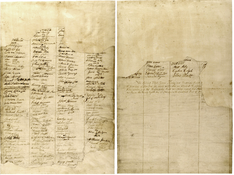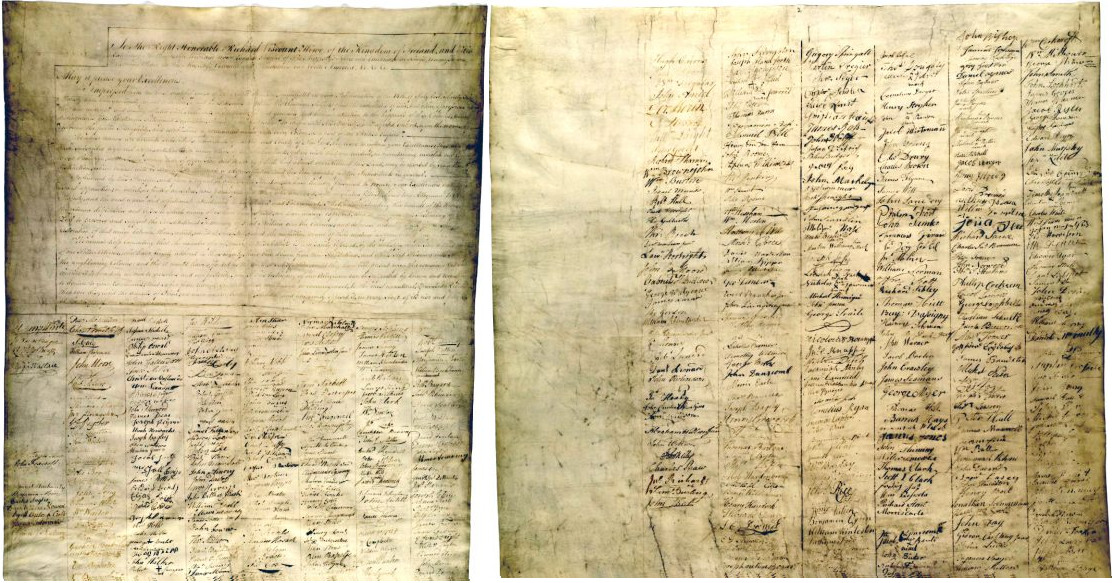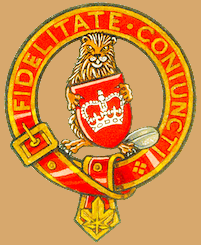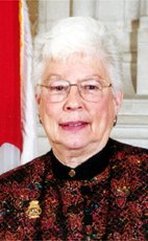paper is all that remains of an important counter-point to the
Declaration of Independence. The document is known as the
Loyalist Declaration of Dependence and it was penned
in 1776 in New York. A transcript of the text is as follows:
"To the Right Honorable Richard Viscount Howe, of the Kingdom of Ireland, and
His Excellency The Honorable William Howe, Esquire, General of His Majesty’s
Forces in America, the Kings’ Commissioners for restoring Peace in His Majesty’s
Colonies and Plantations in North America &c. &c. &c.
May it please your excellencies.
Impressed with the most grateful sense of the Royal Clemency, manifested I you
Proclamation of the 14th. Of July last, whereby His Majesty hath been graciously
pleased to declare, “That he is desirous to deliver His American subjects from the
calamities of War, and other oppressions, which they now undergo:” and equally
affected with sentiments of gratitude for the generous and humane attention to the
disposition “to confer with His Majesty’s well affected subjects, upon the means of
restoring the public Tranquility, and establishing a permanent union with every
Colony as a part of the British Empire.”
We whose names are hereunto subscribed, Inhabitants of the City and County of
New-York, beg leave to inform your Excellencies: that altho most of us have
subscribed a general Representation with many other of the Inhabitants; yet we
wish that our conduct, in maintaining inviolate our loyalty to our Sovereign,
against the strong tide of oppression and tyranny, which has almost overwhelmed
this Land, may be marked by some line of distinction, which cannot well be drawn
from the mode of Representation that has been adopted for the Inhabitants in
general.
Influenced by this Principle, and from a regard to our peculiar Situation, we have
humbly presumed to trouble your Excellencies with the second application; in
which, we flatter ourselves, none participate but those who have ever, with
unshaken fidelity, borne true Allegiance to His Majesty, and the most warm and
affectionate attachment to his Person and Government. That, notwithstanding the
tumult of the times, and the extreme difficulties and losses to which many of us
have been exposed, we have always expressed, and do now give this Testimony of
our Zeal to preserve and support the Constitutional Supremacy of Great Britain
over the Colonies; and do most ardently wish for a speedy restoration of that union
between them, which, while it subsisted, proved the unfailing source of their mutual
happiness and prosperity.
We cannot help lamenting that the number of Subscribers to this Address is
necessarily lessened, by the unhappy circumstance that many of our Fellow
Citizens, who have firmly adhered their loyalty, have been driven from their
Habitations, and others sent Prisoners into some of the neighbouring Colonies: and
tho’ it would have afforded us the highest satisfaction, could they have been present
upon this occasion: yet we conceive it to be the duty we owe to ourselves and our
prosperity, whilst this testimony of our Allegiance can be supported by known and
recent facts, to declare to your Excellencies; that so far from having given the last
countenance or encouragement, to the most unnatural, unprovoked Rebellion, that
ever disgraced the annuls of Time; we have on the contrary, steadily and uniformly
opposed it, in every stage of its rise and progress, at the risque of our Lives and
Fortunes."
The only common thread between them being a wish to
express their loyalty in some way. Some of the signers are
known to have joined Loyalist regiments later in the war but
for many this would be their only chance to show their loyalty.
After the names there is a short concluding section that has
been partially obscured:
We, Richard Hoyt Thomas T . . . ing and Frederick Hudson . . . of New York do
hereby certify that we attended the signing . . . and that the subscribers have
voluntarily signed their names.
Twenty Eight day of November in the Seventeenth Year of His Majesty.
 Water-damaged pages
Water-damaged pages Queen's Head Tavern which was
across the street from the town
hall. Presumably this was so the
document could be submitted
immediately afterwards. Or
perhaps they needed some place
with more space. Or perhaps
they just thought the tavern had
the right name for such an event. Whatever the reason the
document is an important glimpse into the ranks of those who
chose to remain loyal to their king during the revolution.
Loyally Yours,
A Kisaragi Colour

 RSS Feed
RSS Feed





